#Institutional reforms
Explore tagged Tumblr posts
Text
How does one assess the impact of transitional justice mechanisms in post-genocide societies?
Transitional justice mechanisms play a crucial role in post-genocide societies by addressing past atrocities, promoting accountability, and fostering reconciliation. Assessing the impact of these mechanisms is essential to understand their effectiveness in healing divided communities and preventing future conflicts. This article explores how one can assess the impact of transitional justice…

View On WordPress
#Accountability#compensation#democratic institutions#healing#historical memory#human rights#impact assessment#institutional reforms#justice#long-term impacts#post-genocide societies#prevention#prosecutions#reconciliation#reparations#socioeconomic reforms#specialized tribunals#structural reforms#transitional justice#truth#truth and reconciliation commissions#victim empowerment#victim participation
0 notes
Text
Corruption in Eastern Europe: A Roadblock to Fair Business Practices by Eastern European Institute for Trade

by Eastern European Institute for Trade
As the countries of Eastern Europe continue to integrate into the global economy, corruption remains a pernicious obstacle hindering the establishment of fair business practices and sustainable growth. This pervasive issue, which affects various facets of society, including political institutions, public administration, and private enterprises, undermines the region's potential for economic development and investment (Borcan et al., 2018). This article delves into the nature of corruption in Eastern Europe, its implications for the business environment, and potential strategies for addressing this deep-rooted problem (Johnson & Kuhn, 2017; Pellegrini & Radošević, 2011).
Transparency International's Corruption Perceptions Index (CPI) consistently ranks several Eastern European nations among the most corrupt countries globally, with bribery, embezzlement, and nepotism being prevalent issues (Transparency International, 2020). These illicit practices can discourage foreign investment and hinder local entrepreneurship, as they create an uneven playing field for businesses and perpetuate economic disparities (Borcan et al., 2018; Pellegrini & Radošević, 2011).
In addition to its direct economic consequences, corruption in Eastern Europe also has a corrosive effect on public trust and confidence in institutions. This erosion of faith in governance can lead to political instability, exacerbating the region's already fraught geopolitical climate (Johnson & Kuhn, 2017). Moreover, corruption undermines the rule of law and the effectiveness of regulatory frameworks, further constraining the potential for fair and transparent business practices (Mungiu-Pippidi, 2015).
Addressing corruption in Eastern Europe requires a multi-pronged approach that encompasses legal, institutional, and societal reforms. Firstly, strengthening the rule of law and enhancing the independence of judiciary systems are critical to ensuring the impartial enforcement of anti-corruption measures (Mungiu-Pippidi, 2015; Pellegrini & Radošević, 2011). This can include the establishment of specialized anti-corruption courts, as well as the promotion of transparent and merit-based appointment processes for judges and other key officials.
Secondly, fostering a culture of transparency and accountability in both public and private sectors is essential for combating corruption (Borcan et al., 2018). This can be achieved through the implementation of robust systems for the disclosure of conflicts of interest, the adoption of international best practices in public procurement, and the promotion of open data initiatives that enable public scrutiny of government and corporate activities (Johnson & Kuhn, 2017).
Lastly, engaging civil society and the media in anti-corruption efforts can be a powerful tool for raising awareness and promoting public vigilance against corrupt practices (Mungiu-Pippidi, 2015). By supporting the work of investigative journalists, whistleblowers, and non-governmental organizations, Eastern European countries can foster a more informed and engaged citizenry, capable of holding institutions and businesses accountable for their actions.
In conclusion, corruption in Eastern Europe poses a formidable challenge to the establishment of fair business practices and sustainable economic development. However, by implementing a comprehensive approach that addresses the legal, institutional, and societal dimensions of the problem, the region's nations can begin to dismantle the roadblocks posed by corruption and unlock their full potential for growth.
References:
Borcan, O., Olsson, O., & Putterman, L. (2018). State history and economic development: Evidence from six millennia. Journal of Economic Growth, 23(1), 1-40.
Johnson, S., & Kuhn, M. (2017). Corruption and economic development in Eastern Europe. Eastern European Economics, 55(4), 261-275
Mungiu-Pippidi, A. (2015). The quest for good governance: How societies develop control of corruption. Cambridge University Press.
Pellegrini, L., & Radošević, S. (2011). Knowledge-based economy and social capital in Central and Eastern Europe. Communist and Post-Communist Studies, 44(1), 19-32.
Transparency International. (2020). Corruption Perceptions Index 2020. Sourced from https://www.transparency.org/en/cpi/2020/index
Read more at the Eastern European Institute for Trade.
#Eastern European Institute for Trade#EEIT#Corruption#Eastern Europe#Fair business practices#Economic development#Transparency#Accountability#Rule of law#Judiciary systems#Bribery#Embezzlement#Nepotism#Foreign investment#Public trust#Regulatory frameworks#Legal reforms#Institutional reforms#Societal reforms#Public procurement#Open data initiatives#Civil society
0 notes
Text
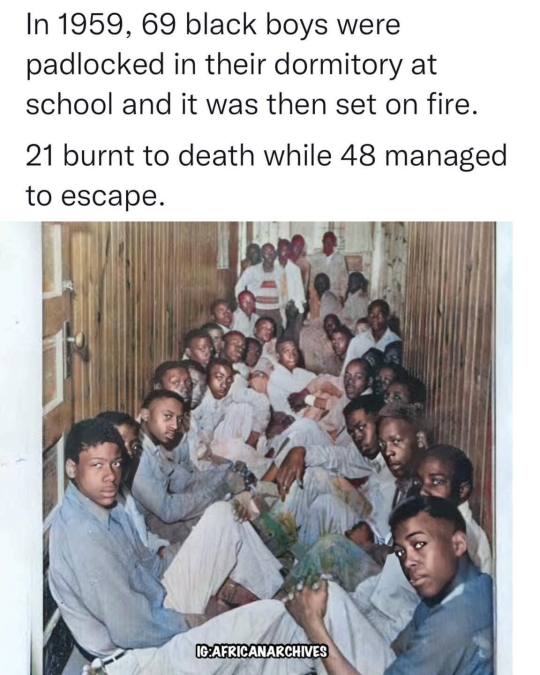
On March 5th, 1959, 69 African American boys, ages 13 to 17, were padlocked in their dormitory for the night at the Negro Boys Industrial School in Wrightsville. Around 4 a.m., a fire mysteriously ignited, forcing the boys to fight and claw their way out of the burning building. The old, run-down, & low-funded facility, just 15 minutes south of Little Rock, housed 69 teens from ages 13-17. Most were either homeless or incarcerated for petty crimes such as doing pranks. 48 boys managed to escape the fire. The doors were locked from the outside and fire mysteriously ignited on a cold, wet morning, following earlier thunderstorms in the same area of rural Pulaski County. The horrific event brought attention to the deplorable conditions in which the boys lived. The boys all slept in a space barely big enough for them to move around & theyre one foot apart from one another & their bathroom was a bucket at the corner where they had to defecate in. In an ironic twist, the land in which the school stood is now the Arkansas Department of Correction Facility Wrightsville Unit. In 2019 a plaque was finally placed after 60 years.
PURE EVIL!!! MY GOD!!
#white racial hatred#white people are evil#racism#civil rights#history#black history#historical injustice#institutional neglect#fire tragedy#juvenile justice#systemic racism#correctional facilities#commemoration#memorialization#social reform
1K notes
·
View notes
Text
i will always be a something akin to a traveling hedge knight bri serving the ppl in need over being tied to any nobles and institutions like a glorified bodyguard for the rest of her life when it comes to endgames idc what george wants to cook i will remain #unmoved
#u cant reform that shit enough for me to gaf#like i understand the whole knighthood thing and briennes thing of attaching herself to a key individual and the whole romance of it re#knighthood but i still dont give a fuck#also wont buy her being able to do more good in a reformed institution fuck u gurm i wont buy it u fraud
37 notes
·
View notes
Text
complexities,perplexities or some thoughts I had at 2am about kento & hiromi
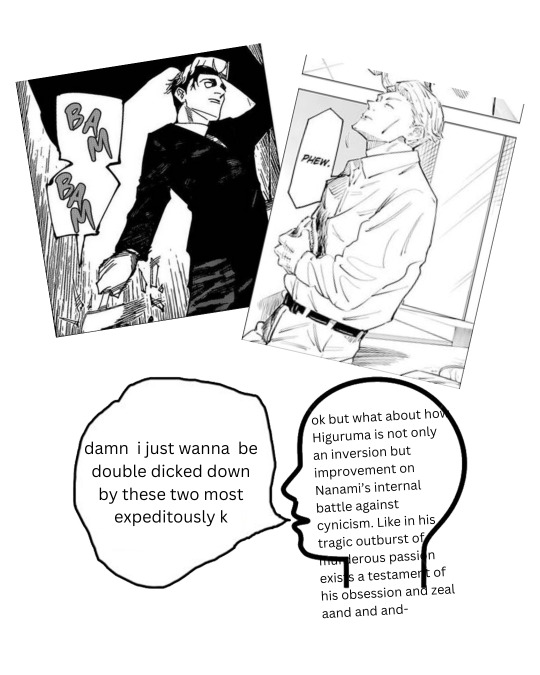
idk im just ramblin' here - u been warned
When i first fell for nanami kento, i thought it was because of his commitment to his principles, the steadfastness in that regard.
i definitely find a parallel of that in Higuruma, even though it was less tempered idealism than "lost (his) temper" idealism - Yet if anything, that tragic outburst of murderous passion is testament of his obsession and zeal. It's his temporary denial and anguish that underscores years of enduring such bitterness and frustration, the decades long slog proving the strength of his willpower, that accumulates into one terrible moment of weakness; a process that simultaneously corroborates and yet is corrosive to his convictions. And now his conscience will have to suffer that slip-up forever.
Something has died in him; if it wasn't already dying for a long time. What survives, subsequently? Or what is rebirthed? I don't regard his psychotic break as fragility. After all, can we recognise someone's strength only after they've been pushed to a breaking point? And it takes a different sort of strength of will to rebuild, to live past who you thought you were, to accept becoming someone you thought you'd never be. Maybe it even takes an admission of weakness, and gentleness...
Higuruma ultimately finds his North Star again, remembers why he became an attorney, it's a return to his original beliefs; There's a definite through line despite the ramification of his actions, the kind of consistency and commitment which I find so compelling, that's a quality he shares with Nanami.
But Nanami's lapse is far less ruinous, his escapist delusion leads him to play a salaryman for a few years, compared to Higuruma becoming a damning executioner in a day. When Nanami rediscovered his purpose, he just shrugged off the corporate schtick and becomes a jujutsu sorceror again, in a sense accepting what he knew he was destined for from an early age. He accepts the truth and returns to a reality already familiar, albeit unpleasantly familiar, to him.
For Higuruma there's so such going back. That "reality" has vanished. No old job or routine he can simply pick up again.
Higuruma's "getting lost" has much bigger consequences - he can no longer be a lawyer, what was once his calling are now mere echoes of the past, reminders of the things that made him him.
The years of effort molding his identity have been entirely stripped away, by his own hands. Imagine all that pain and confusion on top of how hard it is for him to navigate through his guilt - fighting Sukuna was meant to be an act of, if not absolution then penance, hell, probably even capital punishment. But he didn't die so now what? it's just...purgatory for him?
Adding to that, he's supposed to be the 'next' Gojo Satoru? Perceived that way for his power alone? Admired or even looked up to, in some respects? How laughable. How cruel.
Pressured to live up to that mantle, when he already has such a hollowed out sense of self, I suspect being valorised that way is a further type of torturous erosion. But I also know Higuruma isn't the type to permit himself to wallow in such self-pity for long; ironically in a way that makes him resemble Satoru, he won't let reputation define who he is. So, I don't think that bothers him as much.
The real challenge is finding out how to operate in a new system, above or outside the laws he once upheld, in a way that's aligned to his fundamental values, to preserve some version of his old self. Now he's in a job where he can make the call to kill curse users, at his own discretion? Who's going to question his judgement, besides himself? What's the line between vigilante justice and divine retribution?
So, I honestly don't know if Higuruma can even adhere to those same strict ethical codes he had before, how much his basic sense of right and wrong has shifted or will shift due to the nature of his new work.
Which is all to say, I wonder now if maybe the appeal I see in Higuruma isn't exactly steadfastness at all, but flux instead; that is, the seemingly contradictory responsibility and impetus of self-determination, through the construct and malleability of moral choices. If there is anything consistent, any proof which makes him an unquestionably principled character, perhaps it would be the very questioning and interrogation of which of his actions are right and fair, a thorough self-examination. If I love Nanami for his stalwart certainty, strangely I'm equally drawn to Higuruma for his rigourous scrutiny, his so-called "uncertainties", how he holds space for...not doubt, but other perspectives and possibilities. And how he finds his way through that maze of multiplicities, whether he's stumbling or striding, I want to accompany him on that journey. Goodness, restraint, mercy...none of these are foregone conclusions with him; that's what makes him so enticing to me.
also yall seen that nose of his? sheesh
anw obvsly can't stop yapping about them my inbox is open if anyone wants to yak about how they will fold you in half are so unique
#higuruma hiromi#nanami kento#jujutsu kaisen#also thinking about how Jujutsu society appears to have a lack of infrastructure for criminal reforms#could Higuruma pioneer institutions/systems for rehabilitation (himself being a beneficiary of them?) like a lab rat#right now it's just some gang monopoly type shit where they hire you if they can't stop you??#idk interesting stuff to sandbox in fics...#sandsorghum
23 notes
·
View notes
Text
Right Wing Watch:
Pam Bondi, President-elect Donald Trump’s second pick for U.S. Attorney General, has ties to New Apostolic Reformation dominionists who worked hard to put Trump back in office and believe his election will bring about a spiritual “great awakening” that will help like-minded right-wing Christians take control of the “seven mountains” of influence in America—government, business, education, media, arts and entertainment, religion, and family.
After Bondi left office as Florida’s Attorney General, she joined the America First Policy Institute, a think tank created by former staffers that, like the Heritage Foundation’s Project 2025, has been laying the groundwork for a “revolutionary” plan to “seize control” and dismantle the “administrative state” -- federal agencies charged with protecting American workers, consumers, and communities from corporate wrongdoing. This year, AFPI partnered with dominionist Lance Wallnau’s Courage Tour, which mixed religious revival with Christian nationalist politics and pro-Trump political organizing. Wallnau celebrated the announcement of Bondi’s nomination as a “great pick,” noting, “She’s part of the America First Policy Institute, a great group I had the privilege of working with in the last year.” Reflecting the MAGA movement’s increasingly aggressive Christian nationalist orientation, AFPI claims scriptural foundations for every aspect of its right-wing policy agenda, which it has called “10 Pillars for Restoring a Nation Under God.”
Former Florida AG Pam Bondi, who Donald Trump tapped to replace Matt Gaetz for the DOJ head job, has ties to Seven Mountains Dominionists and Christian Nationalists.
#Pam Bondi#Trump Administration II#America First Policy Institute#New Apostolic Reformation#Lance Wallnau#Courage Tour#Paula White
21 notes
·
View notes
Text
32 notes
·
View notes
Text
Continuing my Dorley reread and in many ways Dorley is a comedy and one of the most horrifying ways in which Dorley is a comedy is the comedy of watching Steph's idiot self be convinced that she can pull one over on a cult to get transition services from them without herself getting radicalized by said aforementioned cult
#genuinely her lack of self-awareness as she's actively talking herself into being okay with kidnapping is HILARIOUS and also horrifying#theres a lot in here about the inertia of abusive institutions#and how they perpetuate themselves by forcing a lot of otherwise good people to be complicit in them in order to be able to live their live#and how difficult-to-impossible it is to reform that because it's not by a single malicious design so much as a massive pileup of bullshit#and in the case of Dorley it's exaggerated to hell but we've all had to jump through insane hoops at the whims of abusive institutions#in order to get basic fucking healthcare#dorleyposting
72 notes
·
View notes
Text
not sure if this is a hot take but school is extremely traumatic and needs huge reform. it causes immense damage to everyone who goes through it. no large-scale school system is exempt from this. this happens in all countries, not just the ones where it's worst. this problem's also inextricably tied to capitalism and neither can be fixed without also fixing the other
school genuinely breaks people (and others) with even worse being done to those with intellectual disabilities and neurodivergents and those with other psychiatric disorders
#school#tw school#tw school mention#tw school trauma#school trauma#eh cant be bothered to write more tags and gotta get to class soon anyway. nvm edit writing from class#youth liberation#anticapitalista#anti school#also to explicate i do think school could be reformed to be good. not for abolition#school being defined as an organized institution for education – mainly of youth – on mixed subjects in a live format#tho grades should be abolished#both grades as in age groups (should be that students can choose their classes and advance at their own pace. with heavier recommendations#and guidance for lower grades of course. although still no forced classes)#and grades as in numerical/alphabetical quantification of success being forced. should be optional so you can ask for those tho if you want#rambles#anyway school is genuinely making me function much worse. on top of the obvious effect of being horrible for creativity
7 notes
·
View notes
Text
The church when pastors groom and abuse children: uwu everyone deserves forgiveness
The church when a homeless guy steals because he's literally starving: irredeemable scum. I support the 13th amendment because lowly criminals deserve to be enslaved.
#i say the church as a representation of the racist ableist classist institution#built on weaponizing christianity#a lot of christians are pro prison reform#hypocrisy#christian hypocrisy#ex christian#exvangelical#religious trauma#i don't have a problem with christians#i have a problem with the church as an institution#prison reform#abolish prison#prison abolition#reform the 13th amendment#anti slavery#child abuse
19 notes
·
View notes
Text

❛ Why's this feel oddly familiar... ❜
#◜✧ . ❪ muse. tobias. ❫#◜✧ . ❪ tobias ; ic. ❫#◜✧ . ❪ dash commentary. ❫#ADJIADSABHDGBASHUDGVBSAHSAJ HELLLL NAAAAAAAAW#Ren vc: psychologically manipulate sensei. defeat your oppressors and reform the government before sensei.#put together a gun faster than sensei. beat sensei in a sparring match.#Tobias: (INSTANTANEOUS Wammy's House flashbacks where he alr did all that ☝️)#My guy JUST graduated from that fuckass institution LET HIM GO! LET HIM GOOO!!! LET HIM OUTTTTTTTTT 😭😭😭
6 notes
·
View notes
Text
How does one assess the effectiveness of truth and reconciliation processes in addressing war crimes?
Assessing the Effectiveness of Truth and Reconciliation Processes in Addressing War Crimes Introduction Truth and reconciliation processes have emerged as important mechanisms for addressing war crimes and human rights abuses in societies recovering from conflict. These processes aim to uncover the truth about past atrocities, provide justice for victims, promote healing and reconciliation, and…
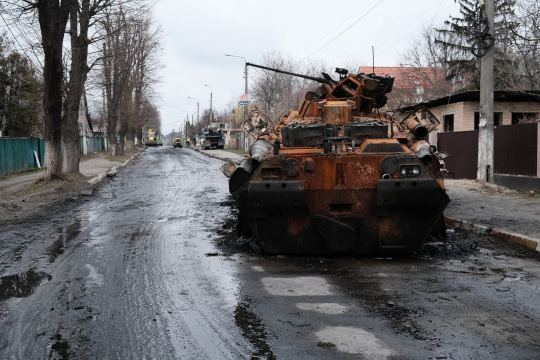
View On WordPress
#Accountability#accountability measures#challenges#contextual factors#cultural context#diverse perspectives#effectiveness assessment#healing#impact on victims#inclusivity#institutional reforms#justice#Limitations#long-term impact#participation#political will#reconciliation#resource constraints#social cohesion#socio-economic context#sustainable peace.#timing#transitional justice#truth#truth and reconciliation processes#truth-seeking#war crimes
0 notes
Text
no particular interest in the argument itself but an uproar - including from people who really do want to reduce incarceration in the US - over biden shortening the sentences of 1500 people already on home release, because one of them did something we actually disapprove of, is... illustrative.
#among 1500 non-violent offenders on home release you are going to find a few who make you angry#but if you want to significantly lower rates of incarceration you are going to have to let people out based on categories they fall into#rather than whether the people with discretion are feeling merciful about each particular case#anyway. perhaps after 15 years in the benevolent and character-building institution of the us prison service this guy is reformed &penitent#and if not i'm unconvinced that another two years would have improved things
4 notes
·
View notes
Text

the fix is in!!
#Supreme Court corruption#judicial integrity#legal ethics#accountability#justice system reform#transparency#judicial independence#public trust#legal oversight#ethical standards#judicial misconduct#Supreme Court accountability#judicial power#political thuggery#institutional limits#checks and balances#public pressure#media coverage#judicial reform#democratic principles#constitutional interpretation#judicial impartiality#judicial appointments#separation of powers#government accountability#supreme court ruling#presidential immunity case#Trump legal arguments#congressional impeachment power#criminal charges
147 notes
·
View notes
Text
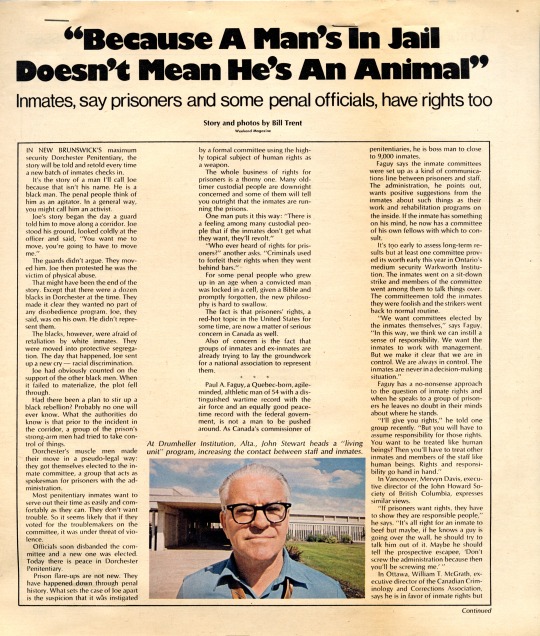
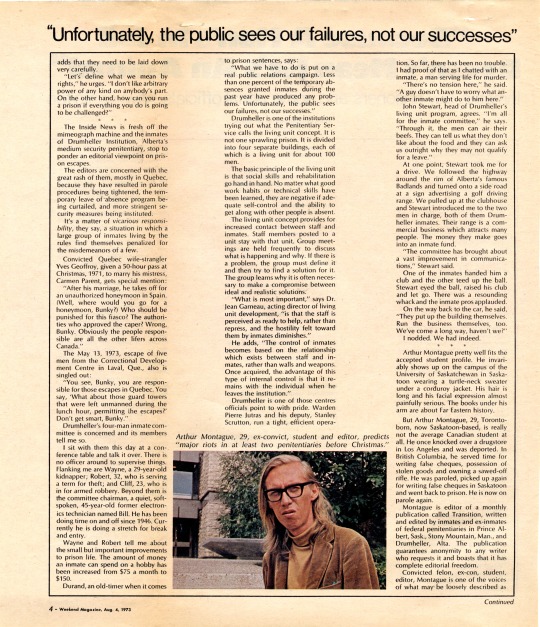
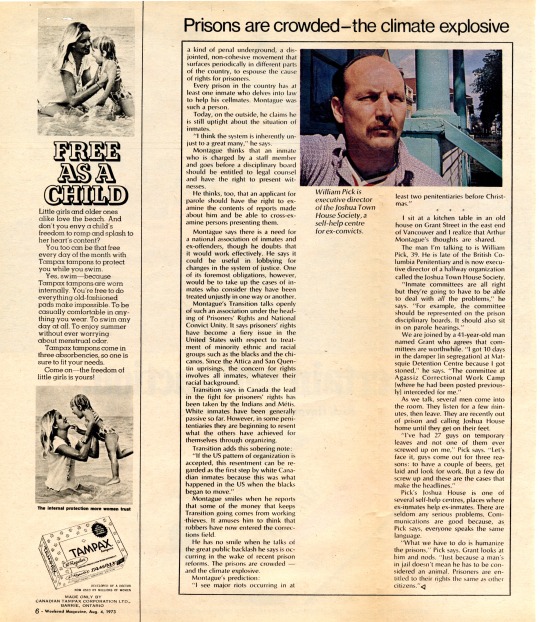
""Because A Man's In Jail Doesn't Mean He's An Animal"," Weekend Magazine. August 4, 1973. Page 3, 4, 6. ---- Inmates, say prisoners and some penal officials, have rights too ---- Story and photos by Bill Trent, Weekend Magazine --- IN NEW BRUNSWICK'S maximum security Dorchester Penitentiary, the story will be told and retold every time a new batch of inmates checks in.
It's the story of a man I'll call Joe because that isn't his name. He is a black man. The penal people think of him as an agitator. In a general way, you might call him an activist.
Joe's story began the day a guard told him to move along a corridor. Joe stood his ground, looked coldly at the officer and said, "You want me to move, you're going to have to move me."
The guards didn't argue. They moved him. Joe then protested he was the victim of physical abuse.
That might have been the end of the story. Except that there were a dozen blacks in Dorchester at the time. They made it clear they wanted no part of any disobedience program. Joe, they said, was on his own. He didn't represent them.
The blacks, however, were afraid of retaliation by white inmates. They were moved into protective segregation. The day that happened, Joe sent up a new cry racial discrimination.
Joe had obviously counted on the support of the other black men. When it failed to materialize, the plot fell through.
Had there been a plan to stir up a black rebellion? Probably no one will ever know. What the authorities do know is that prior to the incident in the corridor, a group of the prison's strong-arm men had tried to take control of things.
Dorchester's muscle men made their move in a pseudo-legal way: they got themselves elected to the inmate committee, a group that acts as spokesman for prisoners with the administration.
Most penitentiary inmates want to serve out their time as easily and comfortably as they can. They don't want trouble. So it seems likely that if they voted for the troublemakers on the committee, it was under threat of violence.
Officials soon disbanded the committee and a new one was elected. Today there is peace in Dorchester Penitentiary.
Prison flare-ups are not new. They have happened down through penal history. What sets the case of Joe apart is the suspicion that it was instigated by a formal committee using the highly topical subject of human rights as a weapon.
The whole business of rights for prisoners is a thorny one. Many old- timer custodial people are downright concerned and some of them will tell you outright that the inmates are running the prisons.
One man puts it this way: "There is a feeling among many custodial people that if the inmates don't get what they want, they'll revolt."
"Who ever heard of rights for prisoners?" another asks. "Criminals used to forfeit their rights when they went behind bars."
For some penal people who grew up in an age when a convicted man was locked in a cell, given a Bible and promptly forgotten, the new philosophy is hard to swallow.
The fact is that prisoners' rights, a red-hot topic in the United States for some time, are now a matter of serious concern in Canada as well.
Also of concern is the fact that groups of inmates and ex-inmates are already trying trying to lay the groundwork for a national association to them represent them.
///
Paul A. Faguy, a Quebec-born, agile-minded, athletic man of 54 with a distinguished wartime record with the air force and an equally good peace-time record with the federal government, is not a man to be pushed around. As Canada's commissioner of penitentiaries, he is boss man to close. to 9,000 inmates.
Faguy says the inmate committees were set up as a kind of communications line between prisoners and staff. The administration, he points out, wants positive suggestions from the inmates about such things as their work and rehabilitation programs on the inside. If the inmate has something on his mind, he now has a committee of his own fellows with which to consult.
It's too early to assess long-term results but at least one committee proved its worth early this year in Ontario's medium security Warkworth Institution. The inmates went on a sit-down strike and members of the committee went among them to talk things over. The committeemen told the inmates they were foolish and the strikers went back to normal routine.
"We want committees elected by the inmates themselves," says Faguy "In this way, we think we can instill a sense of responsibility. We want the inmates to work with management. But we make it clear that we are in control. We are always in control. The inmates are never in a decision-making situation.
Faguy has a no-nonsense approach to the question of inmate rights and when he speaks. to a a group gr of prisoners he leaves no doubt in their minds about where he stands.
"I'll give you rights," he told one group recently. "But you will have to assume responsibility for those rights. You want to be treated like human. beings? Then you'll have to treat other inmates and members of the staff like human beings. Rights and responsibility go hand in hand."
In Vancouver, Mervyn Davis, executive director of the John Howard Society of British Columbia, expresses similar views.
"If prisoners want rights, they have to show they are responsible people," he says. "It's all right for an inmate to beef but maybe, if he knows a guy is going over the wall, he should try to talk him out of it. Maybe he should tell the prospective escapee, 'Don't screw the administration because then you'll be screwing me."
In Ottawa, William T. McGrath, executive director of the Canadian Criminology and Corrections Association, says he is in favor of inmate rights but he adds that they need to be laid down very carefully.
"Let's define what we mean by rights," he urges. "I don't like arbitrary power of any kind on anybody's part. On the other hand, how can you run a prison if everything you do is going to be challenged?"
///
The Inside News is fresh off the mimeograph machine and the inmates of Drumheller Institution, Alberta's medium security penitentiary, stop to ponder an editorial viewpoint on pris on escapes
The editors are concerned with the great rash of them, mostly in Quebec, because they have resulted in parole procedures being tightened, the temporary leave of absence program being curtailed, and more stringent security measures being instituted.
It's a matter of vicarious responsibility, they say, a situation in which a large group of inmates living by the rules find themselves penalized for the misdemeanors of a few.
Convicted Quebec wife-strangler Yves Geoffroy, given a 50-hour pass at Christmas, 1971, to marry his mistress, Carmen Parent, gets special mention:
"After his marriage, he takes off for an unauthorized honeymoon in Spain. (Well, where would you go for a honeymoon, Bunky?) Who should be punished for this fiasco? The authorities who approved the caper? Wrong. Bunky. Obviously the people responsible are all the other lifers across Canada."
The May 13, 1973, escape of five men from the Correctional Development Centre in Laval, Que, also is singled out:
"You see, Bunky, you are responsible for those escapes in Quebec. You say, 'What about those guard towers that were left unmanned during the lunch hour, permitting the escapes?" Don't get smart, Bunky."
Drumheller's four-man inmate committee is concerned and its members tell me so. I sit with them this day at a conference table and talk it over. There is no officer around to supervise things. Flanking me are Wayne, a 29-year-old
kidnapper, Robert, 32, who is serving term for theft, and Cliff, 23, who is in for armed robbery. Beyond them is the committee chairman, a quiet, soft- spoken, 45-year-old former electronics technician named Bill. He has been doing time on and off since 1946. Currently he is doing a stretch for break and entry.
Wayne and Robert tell me about the small but important improvements to prison life. The amount of money an inmate can spend on a hobby has been increased from $75 a month to $150.
Durand, an old-timer when it comes to prison sentences, says: "What we have to do is put on a real public relations campaign. Less than one percent of the temporary absences granted inmates during the past year have produced any problems. Unfortunately, the public sees our failures, not our successes."
Drumheller is one of the institutions trying out what the Penitentiary Service calls the living unit concept. It is not one sprawling prison. It is divided into four separate buildings, each of which is a living unit for about 100 men.
The basic principle of the living unit is that social skills and rehabilitation. go hand in hand. No matter what good work habits or technical skills have been learned, they are negative if adequate self-control and the ability to get along with other people is absent. The living unit concept provides for increased contact between staff and. inmates. Staff members posted to a unit stay with that unit. Group meetings are held frequently to discuss what is happening and why. If there is a problem, the group must define it and then try to find a solution for it. The group learns why it is often necessary to make a compromise between ideal and realistic solutions.
"What is most important," says Dr. Jean Garneau, acting director of living unit development, "is that the staff is perceived as ready to help, rather than repress, and the hostility felt toward them by inmates diminishes."
He adds, "The control of inmates becomes based on the relationship which exists between staff and inmates, rather than walls and weapons. Once acquired, the advantage of this type of internal control is that it remains with the individual when he leaves the institution."
Drumheller is one of those centres officials point to with pride. Warden Pierre Jutras and his deputy, Stanley Scrutton, run a tight, efficient operation. So far, there has been no trouble. I had proof of that as I chatted with an inmate, a man serving life for murder.
"There's no tension here," he said.
"A guy doesn't have to worry what another inmate might do to him here." John Stewart, head of Drumheller's living unit program, agrees. "I'm all for the inmate committee," he says. "Through it, the men can air their beefs. They can tell us what they don't like about the food and they can ask us outright why they may not qualify for a leave."
At one point, Stewart took me for a drive. We followed the highway around the rim of Alberta's famous Badlands and turned onto a side road at a sign advertising a golf driving range. We pulled up at the clubhouse and Stewart introduced me to the two men in charge, both of them Drumheller inmates. Their range is a commercial business which attracts many people. The money they make goes into an inmate fund.
"The committee has brought about a vast improvement in communications," Stewart said.
One of the inmates handed him club and the other teed up the ball. Stewart eyed the ball, raised his club and let go. There was a resounding whack and the inmate pros applauded. On the way back to the car, he said, "They put up the building themselves. Run the business themselves, too. We've come a long way, haven't we?"
I nodded. We had indeed.
Arthur Montague pretty well fits the accepted student profile. He invariably shows up on the campus of the University of Saskatchewan in Saskatoon wearing a turtle-neck sweater under a corduroy jacket. His hair is long and his facial expression almost painfully serious. The books under his arm are about Far Eastern history.
But Arthur Montague, 29, Toronto-born, now Saskatoon-based, is really not the average Canadian student at all. He once knocked over a drugstore in Los Angeles and was deported. In British Columbia, he served time for writing false cheques, possession of stolen goods and owning a sawed-off rifle. He was paroled, picked up again for writing false cheques in Saskatoon. and went back to prison. He is now on parole again.
Montague is editor of a monthly publication called Transition, written and edited by inmates and ex-inmates of federal penitentiaries in Prince Albert, Sask., Stony Mountain, Man., and Drumheller, Alta. The publication guarantees anonymity to any writer who requests it and boasts that it has complete editorial freedom.
Convicted felon, ex-con, student. editor, Montague is one of the voices of what may be loosely described as a kind of penal underground, a disjointed, non-cohesive movement that surfaces periodically in different parts of the country, to espouse the cause of rights for prisoners
Every prison in the country has at least one inmate who delves into law to help his cellmates. Montague was such a person.
Today, on the outside, he claims he is still uptight about the situation of inmates.
"I think the system is inherently unjust to a great many," he says, Montague thinks that an inmate who is charged by a staff member and goes before a disciplinary board should be entitled to legal counsel and have the right to present witnesses.
He thinks, too, that an applicant for parole should have the right to examine the contents of reports made about him and be able to cross-examine persons presenting them.
Montague says there is a need for a national association of inmates and ex-offenders, though he doubts that it would work effectively. He says it could be useful in lobbying for changes in the system of justice. One of its foremost obligations, however, would be to take up the cases of inmates who consider they have been treated unjustly in one way or another.
Montague's Transition talks openly of such an association under the heading of Prisoners' Rights and National Convict Unity. It says prisoners' rights have become a fiery issue in the United States with respect to treatment of minority ethnic and racial groups such as the blacks and the chicanos. Since the Attica and San Quentin uprisings, the concern for rights involves all inmates, whatever their racial background.
Transition says in Canada the lead in the fight for prisoners' rights has been taken by the Indians and Métis, White inmates have been generally passive so far. However, in some penitentiaries they are beginning to resent what the others have achieved for themselves through organizing.
Transition adds this sobering note: "If the US pattern of organization is accepted, this resentment can be regarded as the first step by white Canadian inmates because this was what happened in the US when the blacks began to move."
Montague smiles when he reports that some of the money that keeps Transition going comes from working thieves. It amuses him to think that robbers have now entered the corrections field.
He has no smile when he talks of the great public backlash he says is occurring in the wake of recent prison reforms. The prisons are crowded and the climate explosive. Montague's prediction:
"I see major riots occurring in at least two penitentiaries before Christmas."
I sit at a kitchen table in an old house on Grant Street in the east end of Vancouver and I realize that Arthur Montague's thoughts are shared.
The man I'm talking to is William Pick, 39. He is late of the British Columbia Penitentiary and is now executive director of a halfway organization called the Joshua Town House Society.
"Inmate committees are all right but they're going to have to be able to deal with all the problems," he says. "For example, the committee should be represented on the prison disciplinary boards. It should also sit in on parole hearings."
We are joined by a 41-year-old man named Grant who agrees that committees are worthwhile. "I got 10 days in the damper [in segregation] at Matsqui Detention Centre because I got stoned," he says. "The committee at Agassiz Correctional Work Camp (where he had been posted previously) interceded for me."
As we talk, several men come into the room. They listen for a few minutes, then leave. They are recently out of prison and calling Joshua House home until they get on their feet.
"I've had 27 guys on temporary leaves and not one of them ever screwed up on me." Pick says. "Let's face it, guys come out for three reasons: to have a couple of beers, get laid and look for work. But a few do screw up and these are the cases that make the headlines."
Pick's Joshua House is one of several self-help centres, places where ex-inmates help ex-inmates. There are seldom any serious problems. Communications are good because, as Pick says, everyone speaks the same language.
"What we have to do is humanize the prisons," Pick says. Grant looks at him and nods. "Just because a man's in jail doesn't mean he has to be considered an animal. Prisoners are entitled to their rights the same as other citizens."
Photos:
Page 3: At Drumheller Institution, Alta., John Stewart heads a "living unit" program, increasing the contact between staff and inmates,
Page 4: Arthur Montague, 29, ex-convict, student and editor, predicts "major riots in at least two penitentiaries before Christmas."
Page 6: William Pick is executive director of the Joshua Town House Society, a self-help centre for ex-convicts.
#life inside#prisoner rights#penal reform#inmate committees#prisoner organizing#prisoner protests#words from the inside#ex-convicts#drumheller institution#british columbia penitentiary#dorchester penitentiary#riot in cell block canada#canadian penitentiary service#saskatoon#vancouver#prison democracy#crime and punishment in canada#history of crime and punishment in canada
5 notes
·
View notes
Text
Alice Herman at The Guardian:
By 9am on Monday, hundreds of worshipers who had gathered under a tent in Eau Claire, Wisconsin, were already on their feet. Praiseful music bumped from enormous speakers. The temperature was pushing 90F (32C). The congregants had gathered in north-western Wisconsin for the Courage Tour, a travelling tent revival featuring a lineup of charismatic preachers and self-styled prophets promising healing, and delivering a political message: register to vote. Watch, or work, the polls. And help deliver the 2024 election to Donald Trump. Serving as a voter registration drive and hub for recruiting poll workers, it was no mistake that the Courage Tour came to Wisconsin just three months ahead of the presidential election in November. The tour had already visited three other swing states: Georgia, Michigan and Arizona. Heavy-hitting Maga organizations – including America First Policy Institute, TPUSA Faith and America First Works – had a presence outside the tent. Inside, headlining the event was Lance Wallnau, a prominent figure in the New Apostolic Reformation – a movement on the right that embraces modern-day apostles, aims to establish Christian dominion over society and politics and has grown in influence since Trump was elected president in 2016.
“‘Pray for your rulers,’ that’s about as far as we got in the Bible,” said Wallnau, setting the tone for the day, which would feature a series of sermons focused on the ideal role of Christians in government and society. “I think what’s happened is over time, we began to realize you cannot trust that government like you thought you could trust, and you can’t trust the media to tell you what’s really happening,” he exclaimed. What followed in Wallnau’s morning sermon were a series of greatest hits of the Maga right: January 6 (not an insurrection), the 2020 election (marred by fraud) and Covid-19 (a Chinese bioweapon). Many of the attendees had learned of the event from Eau Claire’s Oasis church – a Pentecostal church whose congregants were already familiar with the movement’s goal to turn believers into activists with a religious mission. “This is wonderful,” said Cyndi Lund, an Oasis churchgoer who attended the four-day event. “I teach a class on biblical citizenship – the Lord put in my heart that we have to be voting biblically, and if nothing else, we have a duty in America to vote.”
According to the preachers who sermonized on Monday, the correct biblical worldview is a deeply conservative one. The speakers repeatedly stated their opposition to abortion and LGBTQ+ rights and inclusion, ideas that were elaborated on in pamphlets passed around the crowd and on three large screens facing the audience. (“Tolerance IS NOT A commandment,” read one poster, propped up in front of the pro-Trump Turning Point USA stall outside the tent.) After Wallnau spoke, Bill Federer, an evangelist who has written more than thirty books weighing in on US history from an anti-communist and rightwing perspective, offered a brief and often intensely inaccurate, intellectual history of the US and Europe. During his talk, Federer dropped references to the villains of his historiography – among them Karl Marx, Fidel Castro, the German philosopher Hegel and, “a little closer to home”, the political theorist of the New Left, Saul Alinsky. The crowd, apparently already versed in Federer’s intellectual universe, groaned and booed when Federer mentioned Alinsky.
The Courage Tour led by Christian Nationalists and 7MD advocates Lance Wallnau and Mario Murillo serve one purpose: to elect Donald Trump and other Republicans into office.
#Christian Nationalism#Courage Tour#Lance Wallnau#Mario Murillo#Donald Trump#2024 Presidential Election#2024 Elections#Christian Right#America First Policy Institute#TPUSA Faith#Turning Point Faith#America First Works#New Apostolic Reformation#Seven Mountains Dominionism#Bill Federer#Mercedes Sparks#Joshua Caleb#The Lion Of Judah
5 notes
·
View notes